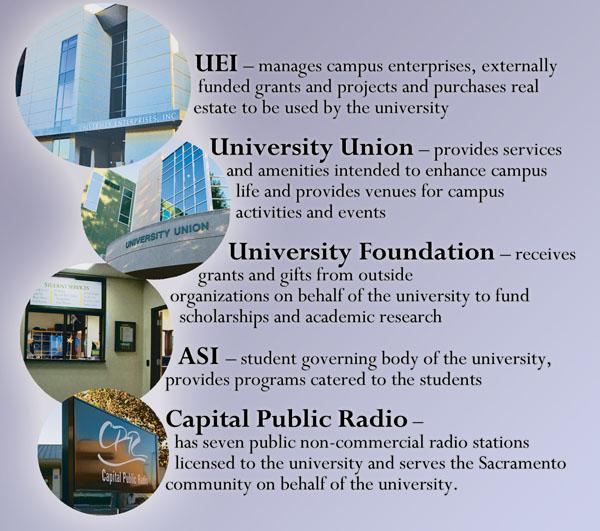Auxiliary organizations benefit Sac State

Auxiliary organizations benefit Sac State
December 3, 2009
Sacramento State has five nonprofit auxiliary organizations that are overseen by the university and provide programs and services that the university, as a public institution, cannot provide.
According to the Compilation of Policies and Procedures for CSU Auxiliary Organizations, these organizations “promote or assist any campus of the CSU, or to receive gifts, property and funds to be used for the benefit of such campus or person or organization.”
Sac State’s auxiliaries are University Enterprises Inc., the University Union, the University Foundation, Associated Students Inc., and Capital Public Radio.
“Basically, auxiliaries exist to do the work that cannot be done by law by a public university that’s funded by taxpayers,” said Gloria Moraga, associate vice president for public affairs. “So there’s certain things that we’re prohibited from doing, and the auxiliaries help do that to support programs that are needed by students and by others.”
For instance, general fund money can’t be used to buy real estate for the university, or to fund scholarships and grants for academic research.
The largest auxiliary organization is UEI, which manages the Hornet Bookstore in partnership with Follet Co. It also “acquire(s), develop(s) and operate(s) properties for the benefit of Sac State,” said Jim Reinhart, UEI’s executive director.
Among these properties are the Upper East Side Lofts and the California State Teachers’ Retirement System building on Folsom Boulevard.
Moraga said UEI benefits the campus by providing campus dining services, campus-affiliated housing and spaces for classroom use that state funds can’t provide.
Auxiliaries are also established to enhance the students’ campus experience. This is done through the University Union, which provides venues for campus events such as concerts, lectures and comedy shows.
“A student union is a place where campus life happens and where we offer people not only a chance to come and have food, but to hold their meetings and lounge space for people to study,” said University Union Director Bill Olmsted.
Private gifts, grants and funds for the university are also received through auxiliary organizations. At Sac State, the University Foundation fulfills this function.
“The purpose is to support the university’s development effort, bring in private support, development program and oversee gift funds,” said Carole Hayashino, vice president of university advancement. “It’s the philanthropic arm of the university.”
Hayashino said individual donors contribute to an unrestricted fund that is used to support student scholarships and programs such as the honors program and Guardian Scholars.
Auxiliaries also sponsor programs and services catered to students. ASI, the official governing body of the students, fulfills this function through programs.
“A good portion of our student life and service program such as Safe Ride, KSSU, Green Sting, community services, which are all about student serving, is to provide students the opportunity in a working capacity to develop their own skills in a working environment,” said Patricia Worley, ASI’s executive director.
Finally, there are auxiliaries that operate more independently of the university than others. Capital Public Radio, for instance, is licensed by the Federal Communications Commission to serve not just the campus, but also the entire Sacramento community.
“It’s easier for the auxiliary to raise money outside of the university if it acts more independently of the university,” said Rick Eytcheson, president and general manager of Capital Public Radio. “The benefit of all that flows back to the university, the fact that it is a huge public service to the community and it is provided by Sac State.”
While these organizations are auxiliaries of the university, Sac State maintains oversight of each auxiliary. Each auxiliary has board members, designees or appointees who report directly to the campus president.
Also, because auxiliaries are nonprofit organizations established to supplement programs and services provided by the university, they have more flexibility in their operations than other campus departments, said Leslie Davis, executive director of the University Union and president of the Auxiliary Organizations Association.
For instance, auxiliaries, unlike government agencies, are not subject to the California Public Records Act.
There have been criticisms to this flexibility. Organizations like the California Faculty Association believe there should be greater public access to auxiliaries.
Kevin Wehr, president of Sac State’s chapter of the CFA, said that because auxiliaries are “in service of a public institution,” they should be subject to the Public Records Act.
Davis, however, said that including auxiliaries in the Public Records Act is not “very effective.”
“There are a lot of statutes that we’re already required to follow,” Davis said. “Under these guidelines, we believe that most of the information that people have already requested is already available and all they have to do is ask for it.”
Moraga said another reason why auxiliaries should not be subject to the Public Records Act is to protect private donors who wish to remain anonymous.
“Some of the records are not subject to the Public Records Act; others are. There has been a lot of misinformation out regarding what’s public and what isn’t,” Moraga said. “When public records are requested here, it’s taken very seriously and the records have been produced.”
Davis said auxiliaries regularly go through financial and compliance audits, and there is already a high level of transparency among auxiliary organizations.
Wehr, however, thinks otherwise.
“Very little about the workings of auxiliary organizations are open to public view, and a lot of it has absolutely nothing to do with anonymous donors,” Wehr said. “For instance, we can’t look at the budget books for the bookstore. I think a lot of students and a lot of faculty would be very interested to know how much textbooks cost, why they cost that much and what the markup is.”
Wehr said while he doesn’t see anything “fundamentally wrong with the idea of a foundation or an auxiliary organization,” everything needs to be transparent.































































































































